Birthdays are special, and let’s be honest—what’s a birthday without cake? It’s more than just a dessert; it’s a centerpiece of celebration, joy, and sweet memories. But when it comes to the cake, many of us face a classic dilemma: do you bake it yourself or go for a store-bought one? Both options have their appeal, and if you’ve ever wondered, “Is it cheaper to make a birthday cake?”—you’re not alone.
Baking a cake at home might sound like a lot of work, but it’s also a chance to save money, customize every detail, and feel that proud satisfaction of saying, “I made this!” Plus, you can experiment with flavors and decorations that truly reflect the birthday star. On the flip side, grabbing a cake from the store is all about convenience and consistency. You know exactly what you’re getting, and sometimes that’s worth the extra cost.
So, how do you decide? This article is here to help, with a breakdown of costs, a look at the pros and cons, and tips to make whichever route you choose a success. Whether you’re a baking novice or a seasoned cake enthusiast, we’ll explore the question: “Is it cheaper to make a birthday cake?” and help you figure out what works best for you and your celebration!
Table of contents
Is It Cheaper to Make a Birthday Cake? Breaking Down the Costs
When comparing the cost of homemade and store-bought birthday cakes, several factors must be considered. Accordingly, these include the price of ingredients, your time investment, and any additional expenses for tools or decorations. Furthermore, here’s a closer look at each aspect:
Homemade Cakes: Budget-Friendly and Customizable
Baking your own birthday cake involves buying ingredients separately, which might feel like extra effort at first. However, this approach gives you full control over the quality of your ingredients and helps you manage costs effectively. To give you a better idea, here’s a typical cost breakdown for a simple two-layer cake:
| Ingredient | Amount | Approx. Cost | Notes |
|---|---|---|---|
| All-purpose flour | 2 cups | $1.00 | Can use cake flour for a finer texture |
| Granulated sugar | 1.5 cups | $0.75 | Adjust sweetness to taste |
| Butter | 1 cup | $2.50 | Unsalted recommended for better control |
| Eggs | 4 large | $1.50 | Use room temperature eggs |
| Milk | 1 cup | $0.75 | Whole milk adds richness |
| Vanilla extract | 1 tsp | $0.50 | Opt for imitation vanilla for savings |
| Baking powder | 2 tsp | $0.10 | Essential for proper rising |
Estimated Total: $7.00–$15.00
The cost of a homemade cake can vary significantly depending on the recipe and whether your pantry is already stocked with essentials like flour, sugar, and eggs. If you’ve got the basics on hand, you’re likely to save even more. One standout benefit of baking at home is the ability to easily cater to dietary preferences, such as gluten-free or vegan options, without the added expense that often comes with custom orders from a bakery. With homemade cakes, you get the perfect combination of control, creativity, and cost-effectiveness—all wrapped up in a delicious, personalized treat!
Tip: Buy ingredients in bulk to save more over time. Unused items like flour or sugar can be stored for future baking projects.
Internal Link: Find creative ideas for birthday cakes in the best birthday cake guide.
Store-Bought Cakes: Convenience at a Cost
The Convenience of Store-Bought Cakes: Pros and Cons
Store-bought cakes are a lifesaver for anyone short on time. They eliminate the need for mixing, baking, and decorating, making them a convenient choice for busy schedules. However, this convenience often comes at a higher price. Here’s what you can typically expect to pay:
- Grocery Store Cakes: $20–$40 for standard designs and smaller sizes.
- Bakery Cakes: $50–$100+ for custom designs and premium ingredients.
While store-bought cakes save time, they often fall short when it comes to flexibility. Customizing a store-bought cake to meet dietary needs, like gluten-free or vegan options, can be difficult or even impossible. It’s also worth noting that you’re not just paying for the cake itself—the price includes labor, packaging, and brand markups.
Ultimately, the choice between convenience and customization depends on your priorities and the celebration at hand.
Hidden Costs to Consider: Is It Cheaper to Make a Birthday Cake?
When comparing costs, it’s important to look beyond the basic price tags—hidden costs can make a big difference in deciding whether it’s cheaper to make a birthday cake. For homemade cakes, these hidden expenses might include the value of your time (because let’s face it, baking and decorating can be a labor of love) and the cost of any special tools or decorations you might need to buy. On the other hand, store-bought cakes often come with their own extras, like delivery fees or added charges for custom designs. Weighing these factors will help you make the choice that works best for your budget and priorities.
Ingredients and Preparation
For those leaning toward baking their own cake, understanding the ingredients and process is crucial. Let’s break it down step by step:
Essential Ingredients
The ingredients for a standard birthday cake are simple and easy to find. Below is a comprehensive list with tips for substitutions:
| Ingredient | Amount | Notes |
|---|---|---|
| Baking powder | 2 tsp | Ensures the cake rises evenly |
| Salt | 1/2 tsp | Enhances flavor |
| Frosting | As needed | Use store-bought or homemade |
| Food coloring | Optional | Perfect for creating colorful designs |
Actionable Tips:
- Smart Substitutions: Baking on a budget? No problem! If you’re out of butter, margarine works as a great substitute. Need a dairy-free option? Swap whole milk for almond or soy milk without compromising on flavor or texture.
- Upgrade with Organic Ingredients: If you want to take your cake to the next level, consider using organic ingredients. While they can be slightly more expensive, organic flour, eggs, or sugar can enhance the flavor and bring a fresh, wholesome quality to your cake—something you rarely get from store-bought options.
Internal Link: Explore versatile recipes in the birthday cakes guide.
Step-by-Step Preparation
Making a Birthday Cake at Home: Step-by-Step Guide
Baking a birthday cake doesn’t have to feel like a daunting task. Follow these simple steps, and you’ll be baking like a pro in no time!
- Preheat Your Oven
Set the oven to 350°F (175°C). Grease your cake pans and line them with parchment paper to prevent sticking. - Mix the Dry Ingredients
In a medium bowl, whisk together the flour, baking powder, and salt. This ensures an even rise and a consistent texture. - Cream Butter and Sugar
Using a hand or stand mixer, beat butter and sugar in a large bowl until the mixture is light and fluffy. This step is key for a tender, moist cake. - Add Eggs and Vanilla
Beat in the eggs, one at a time, ensuring each is fully incorporated before adding the next. Then mix in vanilla extract to enhance the flavor. - Combine Wet and Dry Ingredients
Gradually add the dry mixture to the wet ingredients, alternating with milk. Start and end with the dry ingredients for a well-balanced batter. - Pour and Bake
Divide the batter evenly between your prepared pans. Bake for 25–30 minutes, or until a toothpick inserted into the center comes out clean. Let the cakes cool completely before frosting.
Tip: Rotate your pans halfway through baking to ensure even cooking.
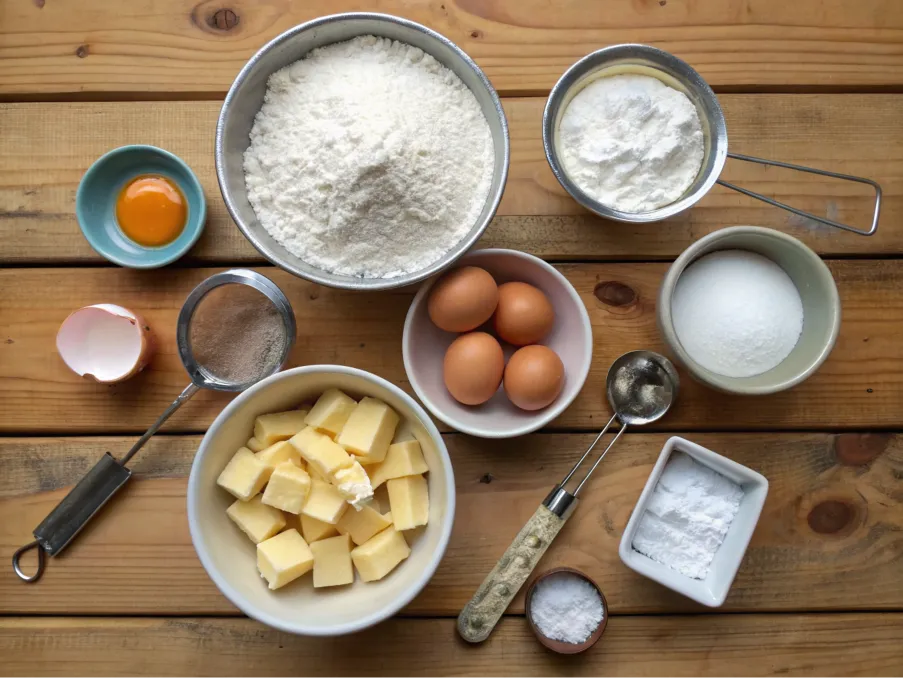
Common Mistakes to Avoid
Even experienced bakers can encounter pitfalls. Here are some common mistakes and how to avoid them:
- Overmixing the Batter: Mixing too much can lead to a dense cake. Stop as soon as the ingredients are combined.
- Incorrect Measurements: Use measuring cups and spoons to ensure accuracy. Baking is a science, and small deviations can affect the final result.
- Not Prepping Pans Properly: Forgetting to grease or line your pans can lead to sticking. Save yourself the hassle by preparing them thoroughly.
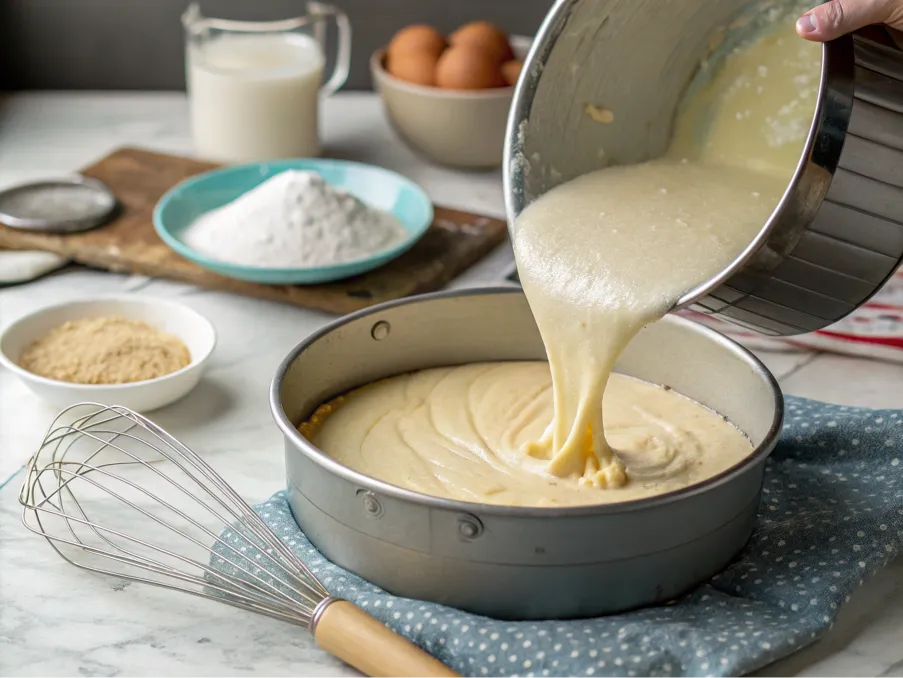
Pro Tips and Creative Variations
Adding a touch of flair and creativity to your homemade birthday cake can transform it into a centerpiece that everyone will remember. Whether you’re crafting a whimsical masterpiece for a child’s party or a chic dessert for an elegant adult gathering, these tips and ideas will help you create a cake that’s as unique as the celebration itself. Get ready to wow your guests with a flawless, one-of-a-kind creation that’s as delightful to look at as it is to eat!
Pro Tips for Perfect Baking
- Prepare Ingredients in Advance
Before starting, measure all your ingredients. This practice ensures smooth workflow and avoids mistakes like leaving out an essential component. For example, pre-measured flour and sugar save you time during the mixing process. - Layer Your Flavors
To make your cake more dynamic, incorporate complementary layers. For instance, pair a rich chocolate layer with a light vanilla sponge. This not only enhances the taste but also creates visual appeal when sliced. - Master the Frosting Process
Use a crumb coat to lock in stray crumbs before applying the final layer of frosting. This technique gives your cake a clean, professional finish. Moreover, chill the cake for 15 minutes after the crumb coat to make the top layer smoother. - Decorate with Intent
A simple garnish of fresh fruit or edible flowers can transform an ordinary cake into a showstopper. Additionally, experimenting with piping techniques can add intricate details without requiring professional expertise.
Internal Link: Discover new ways to enhance your cakes with our kefir sheet cake recipe.
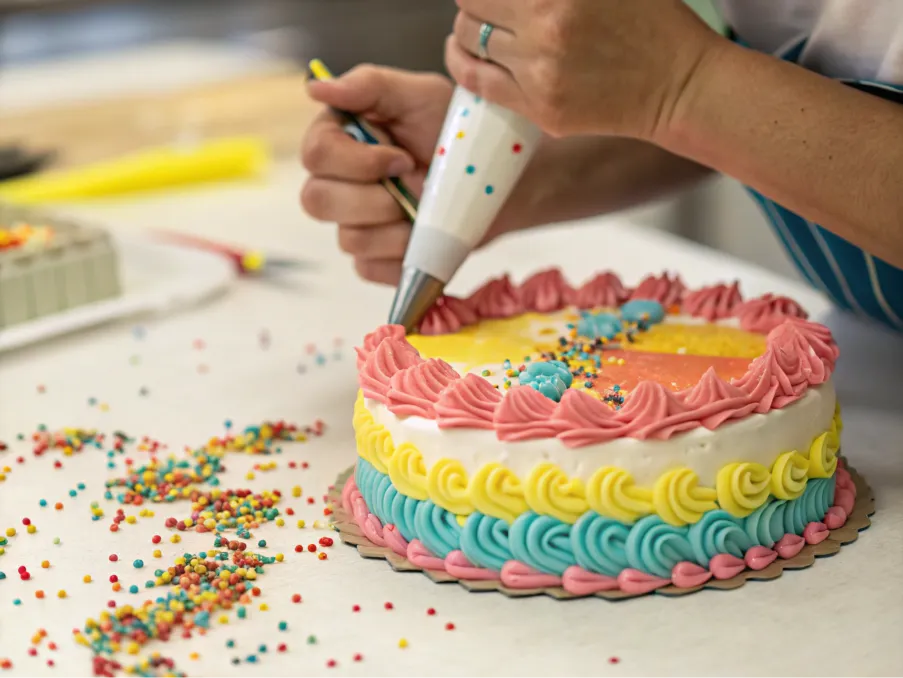
Creative Variations
If you’re ready to go beyond the basics, these variations will inspire you to take your cake to the next level:
- Flavor Combinations: Combine flavors like lemon and lavender for a refreshing twist or opt for decadent pairings like mocha and caramel.
- Textural Enhancements: Add a crunchy layer of nuts or crushed cookies between sponges for unexpected texture.
- Thematic Decorations: Create a cake tailored to the occasion. For instance, use blue frosting and nautical toppers for a seaside theme.
- Dietary Modifications: Substitute almond flour for a gluten-free option or use flaxseed as an egg replacement in vegan recipes.
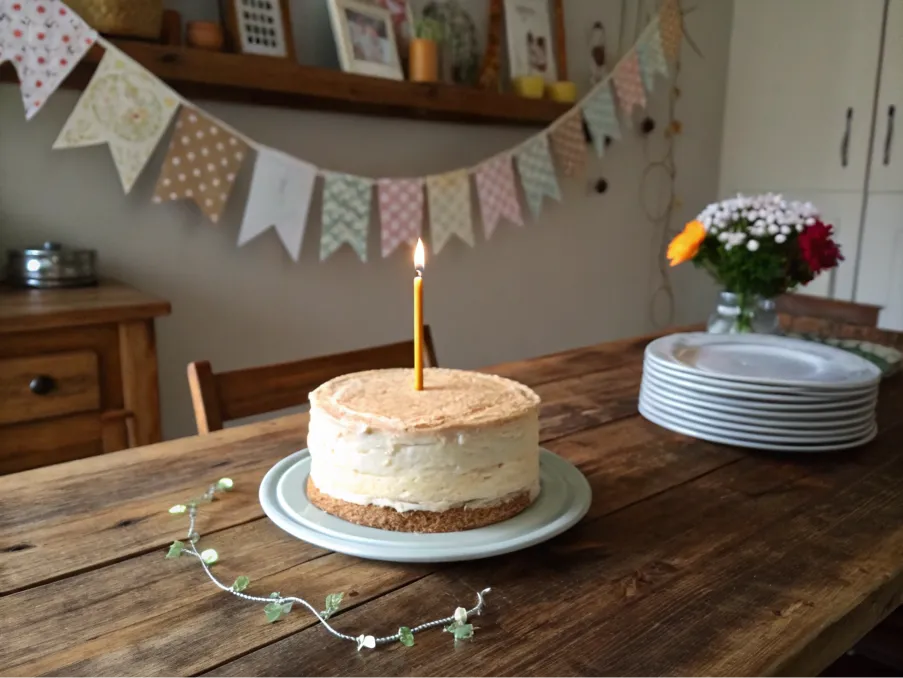
FAQs: Common Questions About Homemade Cakes
Thinking about baking a birthday cake at home? It’s an exciting (and delicious!) project, but you might have a few questions about costs, preparation, and how to make the process as smooth as possible. Don’t worry—we’ve got you covered! Here are answers to some of the most frequently asked questions to help you bake with confidence and create a cake that’s sure to impress.
Is it cheaper to buy or make a birthday cake?
Yes, baking your own cake is usually easier on your wallet—especially if you already have basic baking tools and ingredients. When you buy a cake, you’re also paying for the baker’s time, fancy packaging, and branding, which can quickly add up.
Is it cheaper to bake or buy a cake?
Generally, baking is more budget-friendly. A homemade two-layer cake can cost around $7–$15 in ingredients. Compare that to store-bought cakes, which typically start at $20 and can climb to $100 or more for custom designs.
Is it cheaper to make a cake from scratch or a box mix?
Box mixes are super affordable, costing $2–$5 each. But baking from scratch gives you full control over taste and quality—and it’s still cost-effective if your pantry is already stocked with essentials like flour, sugar, and butter.
What is the average price of a birthday cake?
It depends! Grocery store cakes usually run between $20–$40, while custom cakes from a bakery can range from $50 to well over $100, depending on size and decorations.
How long does it take to bake a cake at home?
From mixing the batter to cooling and decorating, plan on 2–3 hours. It sounds like a lot, but with a bit of prep and patience, the end result is totally worth it!
What are the best ways to save money on homemade cakes?
Shop for ingredients in bulk, reuse pantry staples, and focus on simple decorations. Avoid expensive add-ons unless they significantly enhance the cake’s appeal.
Can you freeze a homemade cake?
Definitely! Just wrap unfrosted layers tightly in plastic wrap and aluminum foil. They’ll stay fresh for up to three months—perfect for prepping ahead of time.
How can I make my cake look more professional?
You don’t need to be a pro baker! A few simple tools, like a turntable for frosting or a piping bag for details, can take your cake to the next level. Smooth the icing with a bench scraper for that clean, bakery-style look. Practice makes perfect!
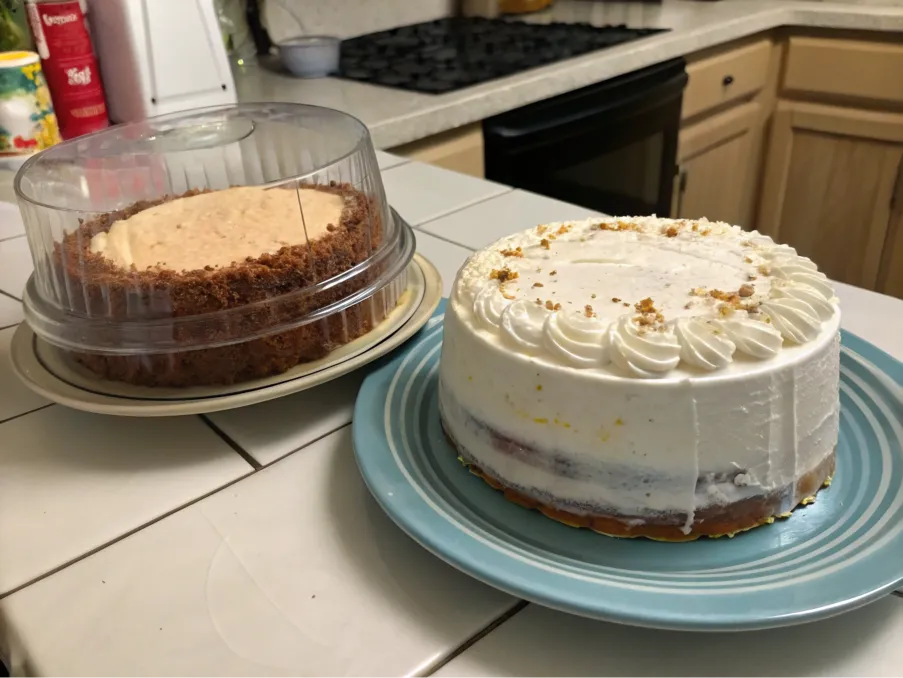
Conclusion
So, is it cheaper to make a birthday cake? If you love baking and enjoy putting a personal touch on your creations, the answer is a clear yes! Homemade cakes are not only more budget-friendly, but they also let you customize flavors, decorations, and even ingredients to fit any theme or dietary preference. On the other hand, if your priority is convenience, a store-bought cake might still be the better choice—it all depends on what works for you.
With the tips, tricks, and comparisons in this guide, you’re ready to decide what suits your celebration best. Whether you whip up something from scratch or pick up a beautifully decorated cake from the store, remember that the real magic lies in the joy and togetherness a birthday cake brings. After all, it’s not just about the cake—it’s about creating sweet memories that everyone will treasure.

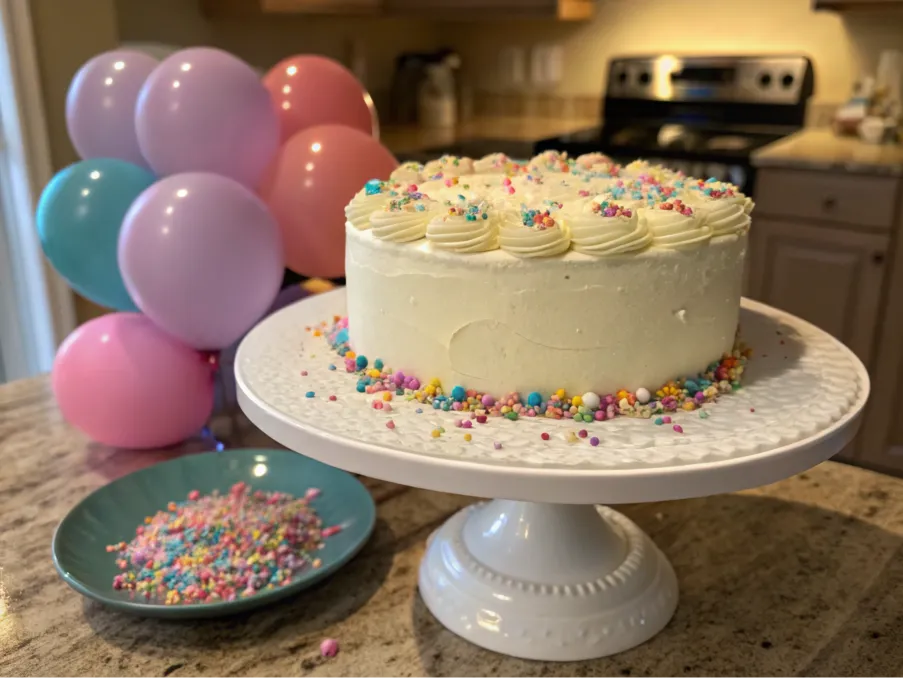
1 thought on “Is it Cheaper to Make a Birthday Cake?”